13 Jul 2018 | Magazine, News and features, Volume 47.02 Summer 2018
[vc_row][vc_column][vc_column_text]
In the summer 2018 issue of Index on Censorship magazine Caroline Muscat takes a closer look at the truths this year’s European Capital of Culture, Valetta in Malta, is hiding
[/vc_column_text][vc_single_image image=”101057″ img_size=”large” add_caption=”yes” alignment=”center”][vc_column_text]
The sprawl of construction sites represents the reality of Malta. It’s a sign of progress, never mind the fact that planning laws are farcical. The country’s affluence is shown by the number of cars on the road, never mind the traffic congestion. Its freedom is evidenced in the number of media outlets and news portals, never mind the fact that they all offer similar content. It’s all about appearance, not substance. Scratch beneath the surface and the problems start to appear.
“National pride has reached historic levels,” Prime Minister Joseph Muscat told more than 100,000 people who flocked to the nation’s capital, Valletta, for its inauguration as Europe’s Capital of Culture 2018. The announcement was made as the country was grappling with the assassination of its most prominent journalist, Daphne Caruana Galizia, and as accusations of a collapse in the rule of law continued to haunt Malta.
Restaurants offering mouth-watering dishes are found across the length and breadth of Malta’s islands, but while digging into a bruschetta few stop to question the sudden influx of Sicilian restaurants that are suspected of being money-laundering fronts for the Sicilian mafia.
Operation Beta, led by the Italian authorities in 2017, culminated in the arrest of 30 people as part of a major clampdown on illegal gaming activities and money laundering linked to a Sicilian family, the Santapaola-Erculanos, linked to the mafia by the Italian media. Almost a year later, Italian police cracked an operation involving Sicilians, Maltese and Libyans smuggling Libyan fuel into the European market. Once again, a link to the Santapaola-Erculano family emerged. A look at the histories of the mafia clans reveals deep family connections to Malta as a hub from which to extend their reach and profits.
The links date back to 1974, when a Sicilian man and his bride went to the Maltese island of Gozo on their honeymoon. They loved the island so much they frequently returned. To the locals who interacted with him in Pjazza San Frangisk, in Victoria, he was known simply as Toto.
But Toto was Salvatore Riina, the mafia boss who terrorised Sicily and made the Italian State tremble while making friends in Malta.
Over the years, Malta has continued to attract shady characters, including politically exposed politicians, from countries including India, Ukraine and Azerbaijan. There are clear risks in probing too deeply into the shadows of modern Malta – not that this is obvious to anyone landing in the country for a fortnight of sun and sea. Popular events, such as the annual music festival the Isle of MTV, continue to offer a distraction on the islands that were once a safe haven for tourists and locals. But the recent release of the Panama Papers linked a Maltese minister, Konrad Mizzi, and the prime minister’s chief of staff, Keith Schembri, to $1.6m payments to Dubai companies. Both deny the claims of payments.
It is now clear that a political party elected in 2013 on the promise of change was not thinking of adding transparency or media freedom. Since the Panama Papers revelations, journalists have piled up stories of scandals, but nothing has changed. Deals selling off the country’s assets continue to be made, shrouded in secrecy. And in the midst of all this, calls for justice for an assassinated journalist continue to echo in the air.
[/vc_column_text][/vc_column][vc_column][/vc_column][vc_column][/vc_column][/vc_row][vc_row][vc_column width=”1/4″][vc_icon icon_fontawesome=”fa fa-quote-left” color=”custom” align=”right” custom_color=”#dd3333″][/vc_column][vc_column width=”3/4″][vc_custom_heading text=”Few stop to question the sudden influx of Sicilian restaurants that are suspected to be money laundering fronts” google_fonts=”font_family:Libre%20Baskerville%3Aregular%2Citalic%2C700|font_style:400%20italic%3A400%3Aitalic”][/vc_column][/vc_row][vc_row][vc_column][vc_column_text]
Daphne Caruana Galizia was killed because of what she exposed. Seven months later, the institutions that failed to protect her are the same institutions that are failing to bring those who ordered her killing to justice. Every month, on the date marking her death, citizens gather to call for justice in the country’s capital. They gather in front of a makeshift memorial before the law courts as a reminder that justice has not been served. Every time, they know they will see each other the following month because nothing will have changed. Yet their presence, and the flowers and candles placed at the foot of the monument, serve as a reminder to the authorities that they will never forget.
Those who mention her name, those who refuse to bow to a society bent by corruption, are insulted and threatened. Journalists and activists keep being reminded of the untold damage they are doing to the country’s reputation. Malta’s image is everything, but it is not what it seems.
When confronted by the news that the European Parliament was sending a delegation to investigate Malta’s anti-money laundering rules, Muscat said: “I invite them to come over to see what a fantastic country we are.” But the Paradise Papers had already shown just how “fantastic” Malta s by casting a dark cloud over its economic miracle.
While workers in other countries have borne the brunt of austerity, the Maltese have never had it so good, shielded by an economic system which relies partly on enticing shell companies to Malta by offering a favourable fiscal regime, in addition to a growing dependence on i-gaming and construction. In addition, Malta’s controversial “sale” of European passports continues, despite concerns about the erosion of democracy.
Living in Malta as a journalist one experiences the stark reality of it all. Those exposing corruption are ostracised and vilified. Their voices are drowned out by the millions spent on the marketing machine to promote Malta and clean its image. Journalism is undermined through an almost complete domination of the narrative by the government – millions of euros spent on PR ridicules weeks of investigative journalism. Government advertising drowns out calls for a democracy that ends corruption and protects freedom of speech.
On 16 May, Labour MP Rosianne Cutajar stood up in parliament and spent 30 minutes criticising the publication of a six-month investigation by The Shift News that exposed pro-government secret Facebook groups with thousands of members posting threats against activists. These posts included threats towards anti-corruption activist Tina Urso, whose home address was also published on the site. Urso filed two complaints with the police, but wasn’t offered any protection.
The MP also said I was sowing the seeds of hatred left behind by Caruana Galizia by attacking the government. Compare this with the exposé of anti-Semitism in the UK Labour Party and the media scandal that followed. In Malta, the scandal was the journalist who dared to speak truth to power.
Caruana Galizia had written: “Malta is in a dangerous place, and now we can no longer say that it is corrupt politicians who have brought it to this point, for it can no longer be denied that those corrupt politicians are a reflection of society.”
In this scenario, the protection of journalists is critical in a landscape that is intolerant of independent thought.
[/vc_column_text][/vc_column][/vc_row][vc_row][vc_column][vc_column_text]
Caroline Muscat is the co-founder of The Shift News, based in Malta
This article was originally published in the Summer 2018 issue of Index on Censorship magazine. Click here to read about the other articles in the issue.
The latest issue of Index on Censorship magazine, Trouble in Paradise, Escape from Reality: what holidaymakers don’t know about their destinations is out now. Buy a subscription. Buy a print copy from bookshops including BFI, Serpentine and MagCulture (London), News from Nowhere (Liverpool), Home (Manchester), and Red Lion Books (Colchester), or via Amazon. Digital versions available via exacteditions.com or iTunes.
Finally, don’t miss our regular quarterly magazine podcast, also on Soundcloud, including an interview with the founder of the Rough Guides, Mark Ellingham. Come by and visit us.
[/vc_column_text][/vc_column][/vc_row][vc_row][vc_column][vc_custom_heading text=”From the Archives”][vc_row_inner][vc_column_inner width=”1/3″][vc_single_image image=”89160″ img_size=”213×287″ alignment=”center” onclick=”custom_link” link=”http://journals.sagepub.com/doi/pdf/10.1080/03064229108535157″][vc_custom_heading text=”Do not disturb” font_container=”tag:p|font_size:24|text_align:left” link=”url:http%3A%2F%2Fjournals.sagepub.com%2Fdoi%2Fpdf%2F10.1177%2F0306422011399822|||”][vc_column_text]2011
In 2011, Charles Young reported that writers, journalists and even DJs are falling foul of Malta’s censorious laws[/vc_column_text][/vc_column_inner][vc_column_inner width=”1/3″][vc_single_image image=”64776″ img_size=”213×287″ alignment=”center” onclick=”custom_link” link=”http://journals.sagepub.com/doi/pdf/10.1080/03064220008536796″][vc_custom_heading text=”Social disturbance” font_container=”tag:p|font_size:24|text_align:left” link=”url:http%3A%2F%2Fjournals.sagepub.com%2Fdoi%2Fpdf%2F10.1177%2F0306422015571882|||”][vc_column_text]March 2015
News footage provided by readers and viewers has entered a new era, where we’re faced with more propaganda, hoaxes and graphic detail than ever before. Vicky Baker looks at the increasingly tough verification process at the BBC’s user-generated content department[/vc_column_text][/vc_column_inner][vc_column_inner width=”1/3″][vc_single_image image=”99282″ img_size=”full” alignment=”center” onclick=”custom_link” link=”http://journals.sagepub.com/doi/pdf/10.1080/03064229308535477″][vc_custom_heading text=”Index around the world” font_container=”tag:p|font_size:24|text_align:left” link=”url:http%3A%2F%2Fjournals.sagepub.com%2Fdoi%2Fpdf%2F10.1177%2F0306422018769585|||”][vc_column_text]Spring 2018
Attacks on journalists are escalating in areas formerly seen as safe,
including the USA and the European Union, says Danyaal Yasin[/vc_column_text][/vc_column_inner][/vc_row_inner][vc_separator][/vc_column][/vc_row][vc_row content_placement=”top”][vc_column width=”1/3″][vc_custom_heading text=”Trouble in Paradise” font_container=”tag:p|font_size:24|text_align:left” link=”url:https%3A%2F%2Fwww.indexoncensorship.org%2F2018%2F04%2Fthe-abuse-of-history%2F|||”][vc_column_text]The summer 2018 issue of Index on Censorship magazine takes you on holiday, just a different kind of holiday. From Malta to the Maldives, we explore how freedom of expression is under attack in dream destinations around the world.
With: Martin Rowson, Jon Savage, Jonathan Tel [/vc_column_text][/vc_column][vc_column width=”1/3″][vc_single_image image=”100843″ img_size=”medium” alignment=”center” onclick=”custom_link” link=”https://www.indexoncensorship.org/2018/06/trouble-in-paradise/”][/vc_column][vc_column width=”1/3″ css=”.vc_custom_1481888488328{padding-bottom: 50px !important;}”][vc_custom_heading text=”Subscribe” font_container=”tag:p|font_size:24|text_align:left” link=”url:https%3A%2F%2Fwww.indexoncensorship.org%2Fsubscribe%2F|||”][vc_column_text]In print, online. In your mailbox, on your iPad.
Subscription options from £18 or just £1.49 in the App Store for a digital issue.
Every subscriber helps support Index on Censorship’s projects around the world.
 SUBSCRIBE NOW[/vc_column_text][/vc_column][/vc_row][vc_row][vc_column][/vc_column][/vc_row]
SUBSCRIBE NOW[/vc_column_text][/vc_column][/vc_row][vc_row][vc_column][/vc_column][/vc_row]
15 Jun 2018 | Azerbaijan, Azerbaijan Statements, Campaigns -- Featured, Statements
Representatives of 42 international and national non-governmental organizations issue the appeal to the Parliamentary Assembly of the Council of Europe (PACE) to request the appointment of a Rapporteur to examine the situation of political prisoners in Azerbaijan.
Below is a short version of the document. Read the full statement here:  csp_letter_to_pace_on_az_political_prisoners_12_june.pdf
csp_letter_to_pace_on_az_political_prisoners_12_june.pdf
Civil society groups report that today there are at least 100 prisoners held on politically motivated charges in Azerbaijan. Among them are dozens of religious activists, at least nine journalists, editors and bloggers as well as members of the political opposition, human rights defenders and several persons who have been imprisoned in retaliation for the actions of their relatives who have fled the country. The most notable cases include the continued imprisonment of former opposition Presidential candidate Ilgar Mammadov, investigative journalist Afghan Mukhtarli, the leader of Muslim Unity Movement Tale Baghirzade, and Mehman Huseynov, young blogger and journalist who documented corruption among high-ranking government officials through his YouTube posts.
It is time for PACE to take decisive action to tackle the issue of political prisoners in Azerbaijan in order to hold the authorities accountable for implementing the commitments undertaken upon the country’s accession to the Council of Europe in 2001.
Resuming the work started by Christopher Strässer will send a first strong signal to the Azerbaijani authorities to demonstrate that the Assembly will not tolerate a continuation of this systematic repressive practice which has no place in a Council of Europe Member State. As politically motivated imprisonment violates the underlying principles of the Council of Europe, appointing a Rapporteur with the mandate to investigate the issue and make recommendations is consistent with the mandate of the organisation.
Reiterating our concerns about the widespread use of politically motivated imprisonment in Azerbaijan we, the undersigned civil society organizations call upon the members of the Committee on Legal Affairs and Human Rights the PACE, which has been mandated to make a decision on this matter, to:
- Appoint a Rapporteur to examine the issue of political prisoners in Azerbaijan;
- Ensure that the Rapporteur is appointed through a fully transparent process and in close consultation with civil society.
Signatures:
- ARTICLE 19 (United Kingdom)
- Association UMDPL (Ukraine)
- Austrian Helsinki Association (Austria)
- Bir Duino (Kyrgyzstan)
- Center for Civil Liberties (Ukraine)
- Center for Participation and Development (Georgia)
- Centre de la protection internationale (France)
- Centre for the Development of Democracy and Human Rights (Russia)
- Citizens’ Watch (Russia)
- Crude Accountability (USA)
- Freedom Files (Russia/Poland)
- Freedom Now (United States)
- German Russian Exchange – DRA (Germany)
- Helsinki Association (Armenia)
- Helsinki Foundation for Human Rights (Poland)
- Human Rights Club (Azerbaijan)
- Human Rights House Foundation (Norway)
- Human Rights Information Center (Ukraine)
- Human Rights Monitoring Institute (Lithuania)
- humanrights.ch (Switzerland)
- Index on Censorship (United Kingdom)
- International Partnership for Human Rights (Belgium)
- Italian Coalition for Civil Liberties – CILD (Italy)
- Kazakhstan International Bureau for Human Rights and the Rule of Law (Kazakhstan)
- Legal Policy Research Center (Kazakhstan)
- Macedonian Helsinki Committee (Macedonia)
- Moscow Helsinki Group (Russia)
- Netherlands Helsinki Committee (The Netherlands)
- Norwegian Helsinki Committee (Norway)
- OMCT (Switzerland)
- Promo LEX (Moldova)
- Protection of rights without borders (Armenia)
- Public Alternative (Ukraine)
- Public Association “Dignity” (Kazakhstan)
- Public Verdict Foundation (Russia)
- Regional Center for Strategic Studies (Azerbaijan/Georgia)
- SOLIDARUS (Germany)
- The Barys Zvozskau Belarusian Human Rights House (Belarus)
- The Kosova Rehabilitation Centre for Torture Victims (Kosovo)
- The Swedish OSSE Network (Sweden)
- Truth Hounds (Ukraine/Georgia)
- Women of the Don (Russia)
Individual signatories from Azerbaijan
- Zohrab Ismayil, Open Azerbaijan Initiative
- Khalid Baghirov, lawyer
- Khadija Ismayilova, investigative journalist
- Akif Gurbanli, Democratic Initiatives Institute
8 Jun 2018 | Americas, Artistic Freedom, Awards, Cuba, Fellowship, Fellowship 2018, News and features
[vc_row][vc_column][vc_column_text]
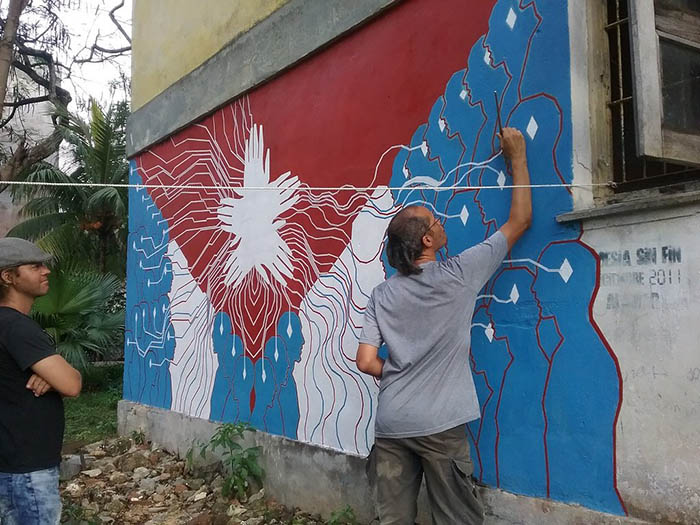
Cuban artist Yasser Castellanos
Despite official efforts to stop it in its tracks, Cuba saw the successful completion of its first independent art biennial, organised without the support of the state, on 15 May. Artist Luis Manuel Otero Alcantara and curator Yanelys Nuñez Leyva, members of the Museum of Dissidence, winner of the 2018 Index on Censorship Freedom of Expression Award for art, organised the ten-day #00Bienal de la Habana, which included over 170 artists, writers, musicians and theorists across nine different exhibitions in artists’ homes and studios around the country’s capital.
“Cuban culture is centralised culture and the government has absolute control,” Nuñez Leyva tells Index on Censorship. “The Ministry of Culture, together with all its branches such as the Union of Writers and Artists of Cuba and the National Council of Plastic Arts, are tentacles of the Ministry of the Interior, so all independent proposals, whether cultural, ecological or campaigns against gender violence, for example, are cursed with all the might of the government-controlled media.”
Even at schools pupils are served up propaganda intent on turning them against non-state-approved artists. Some art school students were shown a video portraying Otero Alcantara as a mercenary. “Such a campaign inevitably generates fear around independent projects which then suffer due to lack of both social and economic support,” Nuñez Leyva says.
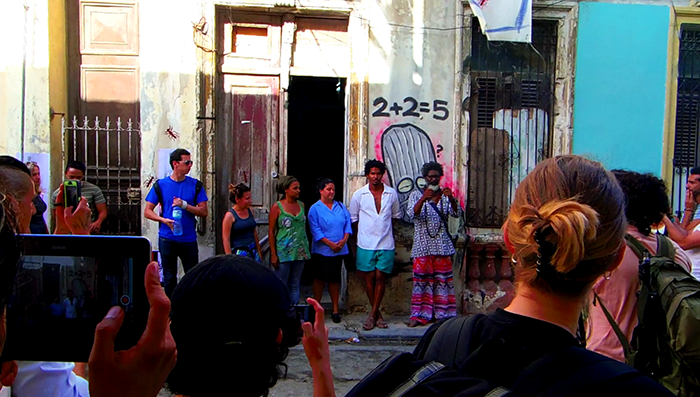
Economic support was one of the biggest obstacles for #00Bienal. “At the beginning, we thought that we would produce it with what we had at hand, but along the way we realised that we needed more,” Nuñez Leyva says. So a Gofundme campaign was set up, which raised $6,574. “But this wasn’t easy: the impact of the US blockade, our isolation from the world of networks and the impossibility of having credit cards made the process anguishing.”
Otero Alcantara was also imprisoned without cause on several occasions as part of the Cuban government’s campaign of harassment. Others who took part in #00Bienal, whether Cuban or foreign, received similar harassment. Many were even denied entry to the country, including the Cuban-American artist Coco Fusco.
When #00Biennial was announced in September 2017, the Cuban government immediately began to show its discontent through its cultural institutions. In an official declaration they branded the organisers as “unscrupulous people”. In response, #00Bienal’s first slogan was: “From the official to the unscrupulous.”
As culture is so tightly controlled in Cuba, only artists seen to be working in the interests of the regime can operate without restriction. Approved artists usually receive perks, something that gives them a higher status in society. Some artists risked all of this by taking part in #00Bienal. “The system used the worst blackmail against them because they gave the event a legitimacy that the government did not want,” Otero Alcantara says. “These artists were threatened by having their government accreditation taken away. Without this, they would find themselves without ‘official work’.”
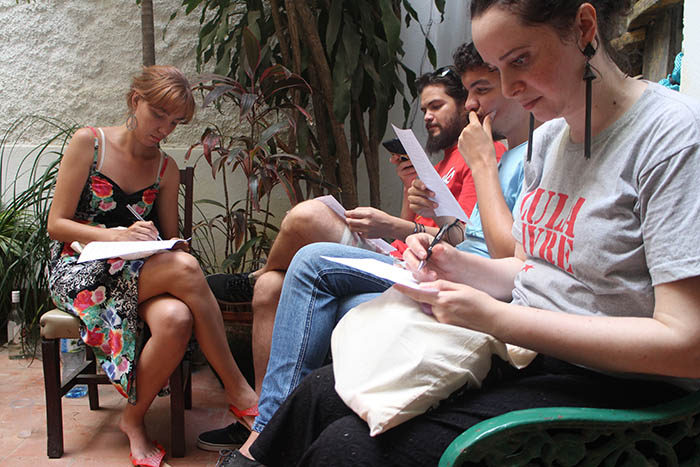
Government agents stalked the exhibitions while the organisers were accused of being in league with Cuba’s enemies. How does one respond to such accusations? “We responded by making an event that is as honest as possible, with a wide range of manifestations and artistic expressions that reflected the reality of Cuban art,” Nuñez Leyva says. “We responded with a list of more than 170 participants, not only Cubans, but from Mexico, Spain, Germany, the United States, Romania, Angola, Colombia, Denmark, Ukraine, Brazil, Venezuela, among them high-profile artists that Cuban institutions admire and collaborated with.”
The authorities even tried to prohibit the public from attending, sometimes successfully. Flyers and stickers were also confiscated. “But none of these actions were ever going to stop the energy of the event,” Otero Alcantara says.
“Despite all this pressure, the event went ahead, demonstrating that there is a group of people who are very courageous and have a real commitment culture,” Nuñez Leyva says. #00Bienal helped revive “a spirit of alternative rebellion” through the involvement of “countless numbers of totally unknown artists” that the state would never endorse.
For Otero Alcantara, the event’s success lies in the cohesion it created between artists, scholars and art enthusiasts, something that is unprecedented in the world of Cuban art. “We built an inclusive space of free creation and true collaboration between the people involved, exhibited the work of artists who were never going to have space in an official Havana Biennial and set a precedent for future projects,” he says. “This is one more step towards eliminating a fear that exists throughout Cuba.”
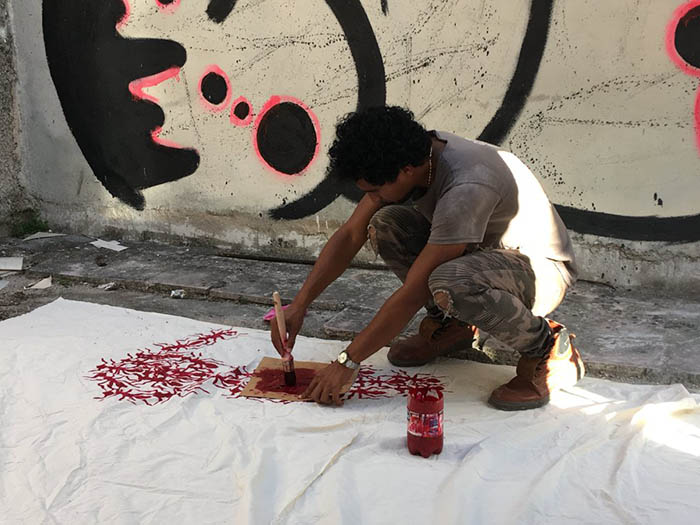
According to the organisers, the terms “revolution” or “revolutionary” have been hijacked and distorted by the Cuban regime. Such deformation has taken root so deep in the imagination of the Cuban people that just by mentioning the word “dissidence” is enough to be shunned, they explain.
“The #00Bienal was a humanistic project that brought to the fore essential values for any society such as unity, solidarity and collaboration,” Nuñez Leyva says. “The event also favoured the less privileged and created beauty and dialogue in favour of a new Cuba.”
The organisers of #00Bienal are under no illusions that life for Cuba’a dissident artists will magically become any easier under Cuba’s new president, Miguel Díaz‑Canel, who took over from Raúl Castro in April 2018. “The Cuban regime is more than any Castro,” Nuñez Leyva says. “It is a system based on a group of families that live both inside and outside the island, who have control over everything, which ultimately contributes to their own wealth.” This corrupt system relies on the deception of a people who have been left without even the strength even to protect themselves against poverty, she adds. “This situation leaves us with little hope, but we have to keep working.”
Otero Alcantara and Nuñez Leyva’s now want to show that #00Bienal wasn’t just a one-off, but is a serious project with longevity. “We will see if it is possible in two years to achieve something similar,” Otero Alcantara says.[/vc_column_text][/vc_column][/vc_row][vc_row][vc_column][vc_media_grid grid_id=”vc_gid:1528443291288-dfd45bff-0a16-7″ include=”100716,100712,100711,100710,100713,100709,100708,100707,100706,100704,100715,100705″][/vc_column][/vc_row][vc_row][vc_column][vc_column_text]
Artists, writers, musicians and theorists who took part in #00Bienal
Amaury Pacheco (Cuba), Iris Ruiz (Cuba), Coco Fusco (Cuba-USA), Tania Bruguera (Cuba), Reynier Leyva Novo (Cuba), Ernesto Oroza (Cuba), Gerardo Mosquera (Cuba), Katherine Bisquet (Cuba), Jose Ernesto Alonso, Yuri Obregón (Cuba), Alein Somonte (Cuba), Alejandro Barreras (Cuba), Anaeli Ibarra (Cuba), Alejandro Taquechel (Cuba), Ariel Maceo Tellez (Cuba), Aryam (Cuba), Aldeide Delgado (Cuba), Armando Cuspinera (Mexico), Antonio Mas (Spain), Alicia Torres (Spain), Ana Olema (Cuba), Alexis Ruiseco (Cuba-USA), Alexandru Raevschi (Germany), Andrés X (Cuba), Alain Aspiolea (Cuba), Alexandre Arrechea (Cuba), Antoni Muntadas (Spain), Biennial Project (USA), Boris González Arenas (Cuba), Colectivo Corason i uevo (Antonio A. Orta, Maykel Almenteros y Pedro Pablo Bacallao) (Cuba), Colectivo Guerrillas Girls, Celia y Yunior (Cuba), Colectivo 2.50 (Ana Gómez, Argelia Leodegarío, Marco Antonio Rodríguez, Itandehuitl Orta, Yuvia Pérez, Esmeralda Pérez) (Mexico), Carlos Manuel Álvarez (Cuba), Clara Astiasarán, Chu (Cuba), David de Omni, David León (Cuba), Danilo Maldonado (El Sexto), Diego Gil (Spain), Eliecer Jiménez Almeida (Cuba), Erish (Mexico), El Oficio (Cuba), Ernesto Hernandez Busto, Enfori García, Filipa César (Portugal), Fabián (2+2 =5) (Cuba), Francis Sánchez (Cuba), Francisco Méndez (Mexico), Francisco Masó (Cuba), Fabian Martínez, Filio Gálvez, Fredric Snitzer, Gabriel Coto (Cuba), Gerardo Stübing (España), Gean Moreno, Henri Eric Hernández (Cuba), Hamlet Lavastida (Cuba), Héctor Trujillo (Cuba), Hugo Patao, Italo Expósito (Cuba), Iván de la Nuez (Cuba), Jesús Hdez-Güero (Cuba), Jesús Benítez (Mexico), José Luis Marrero (Cuba), Josvan Gonzalez Agramonte (Cuba), Julián Yunda Yepes (Mexico), Jenifer Acuña (Cuba), Juan Melo (Colombia), Juan Carlos Alvarez Miranda (Cuba), Jean-Lorin Sterian (Romania), José Bedia (Cuba), Julio César Llopiz (Cuba), Javier Marimón, José Manuel Mesías (Cuba), Keyezua (Angola), Kevin Arrow, Lía Villares (Cuba), Luis Trápaga (Cuba), Luiso, Leandro Villanueva (Sam 33) (Cuba), Lester Dubé (Cuba), Lala Misosniky (Romania), La Alianza (Cuba), Liliam Dooley, Leandro Feal (Cuba), Lourdes Porrata, Miquel García (Spain), Marisol Maza (Mexico), Marcel Marquez (Cuba), Marianna Liosi (Germany), MO colectivo (Mariam Abrajim y Octavio Salazar) (Colombia), Magdiel Aspillaga, Mysora García, Nonardo Perea (Cuba), Natalia López (Colombia), Osmel Almaguer Delgado (Cuba), Osmany Carratalá (Cuba), Oscar Salamanca (Colombia), Orlando Hernández (Cuba), Pablo Pinto (Colombia), Polyanna Morgana (Brazil), Political Architecture: Critical Sustainability (PA:CS) (Denmark), Peter Menéndez, Rafael Carabano (Venezuela), Raúl Meriño (Cuba), Ras Yoe, Ricardo Figueredo, Rodolfo Peraza (Cuba), Rafael Domenech, Rirkrit Tiravanija, Svitlana Biedarieva (Ukraine), Soandry del Río (Cuba), Sandra Ceballos (Cuba), Santiago Alvarez Méndez (Colombia), Sandor (Cuba), Thiago Morandi (Brazil), Tomás Sánchez (Cuba), Tomas Vu, Tonel (Cuba), unx Pardo Ibarra (Colombia), Ulises Valdés (Mexico), Walfrido Valera (Cuba), Yaima Pardo (Cuba), Yasser Castellanos (Cuba), Yesica Suárez (Colombia), Yulier P. (Cuba), Yoenis Eloy Mayeta (Cuba), Yimi Konclase (Cuba), Yvelin Buenrostro (Mexico), Yucef Merhi (Venezuela), Yornel Martínez (Cuba), Yali Romagoza (Cuba), Yanier H. Palao (Cuba).[/vc_column_text][/vc_column][/vc_row][vc_row][vc_column][vc_basic_grid post_type=”post” max_items=”4″ element_width=”6″ grid_id=”vc_gid:1528443291296-0ad2c295-a239-7″ taxonomies=”104″][/vc_column][/vc_row]
31 May 2018 | Mapping Media Freedom, Media Freedom, News and features
[vc_row][vc_column][vc_column_text]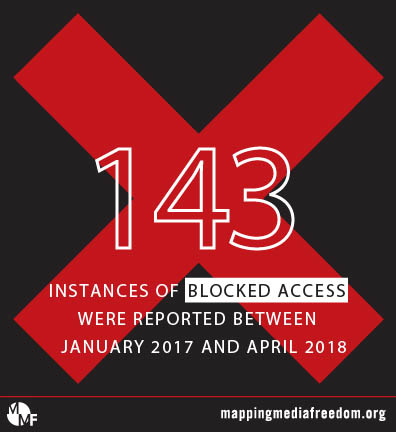 From the beginning of 2017 until April 2018, 143 reports of blocked access, in which journalists were expelled from a location or prevented from speaking to a source, were submitted to Index on Censorship’s Mapping Media Freedom project. Out of the 25 countries in which such violations have occurred, the five worst were: Ukraine, Russia, Belarus, Turkey and France.
From the beginning of 2017 until April 2018, 143 reports of blocked access, in which journalists were expelled from a location or prevented from speaking to a source, were submitted to Index on Censorship’s Mapping Media Freedom project. Out of the 25 countries in which such violations have occurred, the five worst were: Ukraine, Russia, Belarus, Turkey and France.
“Mapping Media Freedom has highlighted is a continual prevention of journalists from doing their job by way of blocked access,” Joy Hyvarinen, head of advocacy at Index on Censorship, said. “For the sake of the public’s right to know, journalists must be granted access in order to eliminate the problem of important issues going underreported.”
Ukraine
With 20 separate incidents of blocked access, Ukraine tops the list. Thirteen of the reports involved Russian or Georgian media outlets, highlighting the tension between the three countries, with November 2017 being the busiest month, with five violations recorded. At least 12 journalists were barred from entering the country in the last 15 months, with another six being deported. Among those deported was Georgian television channel Rustavi-2 journalist Tamaz Shashvishvili, who was forcibly detained in November 2017 by around 15 armed members of Ukraine’s security services who stormed his apartment, hit him in the face with a pistol and blindfolded him.
In another case, two Spanish journalists were deported to the Netherlands in August 2017 and banned from entering the country for three years after being detained for about 20 hours at Kyiv International Airport. They say they were treated like “criminals” and blacklisted from the country until 2020. A spokeswoman for the Ukrainian secret service said that the journalists were barred because of their “activities that contradict the national interest of Ukraine”.
Russia
In Russia, journalists were denied access on 18 occasions, including 10 times from courtrooms and state assemblies. In March 2018, while live reporting from the Dzerzhinsky District Court of St. Petersburg, Sasha Bogino, a correspondent for the online news site Mediadzona, and her colleague photographer David Frenkel were dragged from the hall. In January 2018, journalists were barred from former Kirov governor Nikita Belykh’s court hearing for bribery.
In January 2018, investigative website Russiangate was closed down three hours after publishing an article claiming to have traced expensive properties to director of Russian secret service FSB Aleksandr Bortnikov, following a request of the General Prosecutor’s Office. Editor-in-chief Aleksandrina Elagina was subsequently dismissed from her position, with investors pulling funding for the site causing it to close.
Belarus
In Belarus eight cases, usually with inadequate explanation, were reported. Pavel Dailid, a journalist for the website Pershy Regiyon, was barred from reporting at a local council meeting in December 2017, when deputy chairman of the Ivatsevichi district Ideology department Aliaksandr Velikaselets demanded to see “an accreditation by the local government” despite the council meeting being as open to the public. In another case, a correspondent for the independent newspaper Hazeta Slonimskaya was barred from local meeting in May 2017 by a government official who stood in front of the entrance calling the paper biased. The journalist was invited to the meeting by local residents.
Photojournalists have also been targeted. In July 2017 city authorities in Babruisk banned photography and filming during Belarus’ Independence Day. Journalists for the newspaper Bobruiski Courier and others, therefore, had no opportunity to photograph the festivities during the public holiday. Two months later a journalist was denied accreditation by the Foreign Ministry for the eighth time. The ministry noted that Victar Parfionenka’s accreditation had been rejected because he “had carried out journalistic activities on behalf of a foreign media outlet without accreditation of the Ministry of Foreign Affairs in Belarus”.
Turkey
In the seven out of nine reports from Turkey, access to a number of websites and TV stations was denied. Sendika, a left-wing labour-oriented news website, has been blocked 23 times in all. In January 2018 access to five news websites was banned, including feminist and pro-Kurdish news website jinnews.org, over a report on the murder of three Kurdish women in Paris in January 2013. Access to daily-German newspaper BILD was blocked online in February 2017 after its harsh criticism of the arrest of German-Turkish reporter Deniz Yucel, a correspondent for daily newspaper Die Welt. Kurdish-language newspaper Rojava Medya was also blocked online in May 2017, most likely for its position as the informal successor of Azadiya Welat, which was shut down under State of Emergency rules introduced after the coup attempt on 15 July.
France
Eight reports of blocked access were reported in France. With a presidential election underway in 2017, five of these involved journalists being denied access to candidates, usually by force.
In April 2017, two Buzzfeed News journalists, David Perrotin and Paul Aveline, were physically prevented from filming a meeting with Francois Fillon. The journalists were filming two people who had interrupted a meeting with Filion when security personnel grabbed the men, threatened them and demanded they delete their footage. It was only when the journalists threatened to write an article about the incident that security backed off.
A similar incident occurred in February 2017 when three journalists were violently expelled from a conference with Marine Le Pen, president of the National Front. Working for the daily current affairs show Quotidien, the journalists were violently kicked out of a conference after attempting to ask Le Pen a question about claims she had misused European Parliament funds to pay her bodyguards. Before journalist Paul Larrouturou could finish his question, he was grabbed, ejected by security and was prevented, along with his two colleagues, to regain access, despite his official accreditation. [/vc_column_text][/vc_column][/vc_row][vc_row][vc_column][vc_basic_grid post_type=”post” max_items=”4″ element_width=”6″ grid_id=”vc_gid:1528726702751-832c0106-cd52-7″ taxonomies=”6564″][/vc_column][/vc_row]
![]() SUBSCRIBE NOW[/vc_column_text][/vc_column][/vc_row][vc_row][vc_column][/vc_column][/vc_row]
SUBSCRIBE NOW[/vc_column_text][/vc_column][/vc_row][vc_row][vc_column][/vc_column][/vc_row]




 From the beginning of 2017 until April 2018, 143 reports of blocked access, in which journalists were expelled from a location or prevented from speaking to a source, were submitted to Index on Censorship’s Mapping Media Freedom project. Out of the 25 countries in which such violations have occurred, the five worst were: Ukraine, Russia, Belarus, Turkey and France.
From the beginning of 2017 until April 2018, 143 reports of blocked access, in which journalists were expelled from a location or prevented from speaking to a source, were submitted to Index on Censorship’s Mapping Media Freedom project. Out of the 25 countries in which such violations have occurred, the five worst were: Ukraine, Russia, Belarus, Turkey and France.